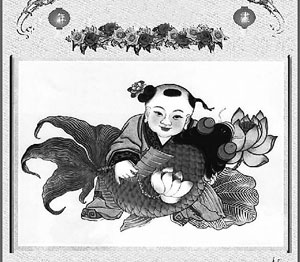|
英文中,“春节”为什么被称为“‘Lunar’New Year”?“年”是如何得来的?中国人过年都有哪些风俗?…… 关于“过年”,您自然一点儿也不陌生。不过,若想把它送出国门之外,讲给老外听,似乎还是难了那么一点点。来吧,阅读以下文字,相信会对您有所帮助。特感谢海外华人Bing Wei贡献此稿。(注:Ms. Bing Wei is a published author in both Chinese and English. A middle chapter of her first novel in English can be read here: http://chinaetiquette101-lifestyle.blogspot.com/2006/02/big-nose-and-me.html )
|
特别推荐:除夕,压岁钱,拜年
 Lion Dance
Lion Dance- What in the store for third, fourth and fifth days is
Lion Dance(狮子舞). The tradition started around 100 AD in China. Drummed with gongs, the lions dance is meant to scare away evil spirits. Lion Dancers are traditionally young men and women of martial art clubs. They train together for years to acquire the skills of bravery, intelligence, endurance and team-work to perform the dance. The Dancers can make the lion's ears wiggle, the eyes blink and the mouth open and the tail wag. In some parts of China, the businesses, such as banks and shopkeepers, often invite the Lion Dancers to pay a visit for good luck. In turn, the dancers collect money from the business owners to give to the poor.
Dragon Parade and Lantern Festival- On the fifteenth day, the holiday ends with a big dragon parade during the day and lantern festival at night. The Dragon is a symbol of strength and goodness in Chinese legend. A colorful long dragon, made of silk, paper and wood, appears with the exploding of the fire cracks. The Dragon chases a pearl, which stands for wealth, through out the Parade. Manyacrobatsand musician in various Chinese costumes also perform.
In the evening, the children drag out their candle lit lanterns in the shape of rabbits or other animal to watch fireworks with the adults who hold the paper lamps with a wooden or bamboo stick. Also known as the Shang Yuan Festival, the Lantern Festival is called the Little New Year. It signals the ending of the series of celebrations for the Chinese New Year. Traditionally, the date was once served as a day for love and matchmaking. The brightest lanterns were symbolic of good luck and hope.
In the end they go home for a bowl of soup of ball-shaped rice-dumpling, stuffed with either red-bean or black sesame paste (Tang Yuan) to complete the New Year observation in sweet happiness. Young people can also stay up, guessing lantern riddles, often containing messages of love.
The Chinese Zodiac- It is said Buddha or the Jade Emperor (the ultimate Emperor for the whole universe in Chinese legend) once called together all the animals on the earth for an important meeting. Only twelve animals turned up: the rat, the ox, the tiger, the rabbit, the dragon, the snake, the horse, the sheep, the monkey, the rooster, the dog and the pig. The rat, being the smartest, jumped on top of the ox to be the first one to arrive.
As a reward, the Buddha/Jade Emperor gave each animal a year in the cycle and declared that anyone born in that year would resemble the animal in some way. In addition, each two hours of the day is also governed by one animal. The hours of 11pm to 1:00 am is by Rat, from 1 am to 3 am by Ox and so on. Six elements of the planet: wood, fire, air, water, gold and earth are also integrated into the animal Zodiac signs.
This year is the Golden Pig (Boar) year and the New Year starts on February 18th, 2007.
Happy Chinese New Year and Gong Xi Fa Cai (May You Prosper)!!
(Contributed by Bing Wei,Ms. Bing Wei is a published author in both Chinese and English. A middle chapter of her first novel in English can be read here: http://chinaetiquette101-lifestyle.blogspot.com/2006/02/big-nose-and-me.html)